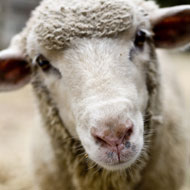Concerns about poor silage as lambing approaches

There have been several reports of wet silages with high potential acid load, which is causing sheep to eat less as lambing approaches.
Specialists from Scotland's Rural College (SRUC) are urging farmers to check the quality of silage they are feeding, as there have been several reports of wet silages with high potential acid load (PAL), which is causing sheep to eat less as lambing approaches.
Senior sheep specialist John Vipond, explained: "When you are totally reliant on silage for energy supply it is very important that you monitor consumption.
"If your silage analysis shows a PAL figure of over 1000, and certainly 1200, intake will be reduced, putting ewes at risk of pregnancy toxaemia. It is more likely to be a problem with wetter silage, below 20 per cent dry matter."
Dr Vipond is particularly concerned about older ewes and gimmers that are lambing for the first time and may not be used to silage. He warned farmers to introduce them to high PAL silages gradually as any sudden intake can cause a sore stomach, meaning they will try to avoid this fodder in future.
He advised getting a vet to test betahydroxybutyrate levels in six ewes from each management group four weeks prior to lambing in order to find out if silage is meeting energy needs.
As a rough consumption guide, however, Dr Vipond recommends weighing bales or a load of pit silage four to six weeks prior to lambing to find out what ewes are eating.
If it is suspected there is variation in dry matter content across the pit, he recommends: “An 80kg ewe should eat 1.2kg dry matter, or about 5kg/ewe day of fresh silage with a 250g/kg dry matter content, allowing for a little wastage."
Dr Vipond also advised several other ways to avoid problems linked to high PAL silage: "For acidic silages below 10.5 ME, and with high protein levels, it is prudent to supply extra energy in late pregnancy as high quality fibre sources like 0.5kg beet pulp nuts, fed at a flat rate for the last month instead of cereals.
"Cereals produce a rapid fall in the rumen pH making it more acidic. If you must feed cereals cap the levels at 300g/day and feed the grains whole. Low protein acidic silages can be supplemented with a 50:50 mix of low copper, wheat dark grains and beet pulp."
For further advice and information, visit SRUC's website.



 The Veterinary Medicines Directorate (VMD) is inviting applications from veterinary students to attend a one-week extramural studies (EMS) placement in July 2026.
The Veterinary Medicines Directorate (VMD) is inviting applications from veterinary students to attend a one-week extramural studies (EMS) placement in July 2026.